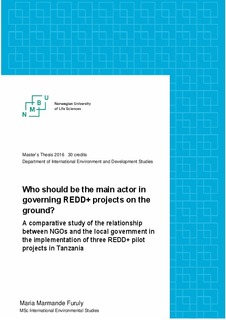| dc.description.abstract | This thesis is grounded in the discussion on how REDD+ should be governed on the ground in Tanzania. The debate has mainly been in relation to two governance structures of REDD+. The first structure is what has been proposed in the National REDD+ Strategy where state authorities are key actors. The second structure is what has been advocated by Civil Society Organizations where forest communities have direct access to the carbon market. The dilemma that these structures present is whether REDD+ funding should be used in order to strengthen weak state governance or to empower forest communities by having direct access to the carbon market? The goal of this thesis has been to evaluate the implications of selecting either of the two models where the main focus has been concerning the implications for the local government in Tanzania.
In order to study the process, a qualitative research approach has been used. The analysis is mainly based on primary data collected by semi-structured interviews, however, secondary data such as research articles, reports and government documents have been used in addition.
The main findings suggest that the district government acted as ‘service providers’ to the NGOs in the implementation process. Although the implications for the district have been positive, it has not been to a large degree. In terms of input legitimacy, it would seem like the informants from the district perceived the process as legitimate, however, there might be some disagreements at village level. From a theoretical perspective, there are some key issues in relation to the legitimacy of the process due to how NGOs were able to dominate in relation to decision-making and how there was a detachment of democratic accountability.
In conclusion, this thesis has argued that the best solution would be to go with the model proposed in the National REDD+ Strategy because it could possibly result in empowerment of the forest sector at local level. | nb_NO |
